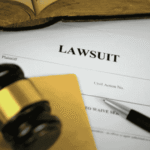Your credit report plays a crucial role in financial decisions—whether you’re applying for a loan, renting an apartment, or even securing a job. But what happens when your credit report contains errors that damage your financial reputation? Can you sue for bad credit reporting?
The short answer is yes, but the process involves understanding your rights under federal laws like the Fair Credit Reporting Act (FCRA). In this guide, we’ll explore:
-
How credit reporting errors affect you
-
Your legal rights under the FCRA
-
Steps to dispute errors
-
When and how you can sue for damages
-
How Radites can help you protect your credit
How Credit Reporting Errors Hurt Your Financial Health
Credit reporting agencies (Equifax, Experian, and TransUnion) collect and maintain consumer credit data. Unfortunately, mistakes happen—24% of Americans have identified errors on their credit reports (Federal Trade Commission).
Common errors include:
✅ Incorrect personal information (wrong name, address, or SSN)
✅ Outdated account status (closed accounts reported as open)
✅ Fraudulent accounts (identity theft)
✅ Duplicate accounts (same debt listed multiple times)
✅ Inaccurate payment history (wrong late payment records)
These errors can lower your credit score, leading to:
-
Higher interest rates on loans
-
Denied mortgage or auto loan applications
-
Difficulty securing rental housing
-
Job rejections (some employers check credit reports)
Your Rights Under the Fair Credit Reporting Act (FCRA)
The FCRA protects consumers from unfair credit reporting practices. Key rights include:
1. Right to Accurate Information
Credit bureaus and data furnishers (banks, lenders) must investigate disputed information within 30 days. If they fail to correct errors, you may have legal grounds to sue.
2. Right to a Free Credit Report
You’re entitled to one free credit report annually from each bureau via
3. Right to Dispute Errors
If you find mistakes, you can file a dispute with:
-
Credit bureaus (online, by mail, or phone)
-
The company that reported the error (bank, credit card issuer)
4. Right to Sue for Damages
If a credit bureau or creditor fails to correct errors, you can sue for:
-
Actual damages (lost loan opportunities, higher interest rates)
-
Punitive damages (if the violation was willful)
-
Legal fees and court costs
Steps to Dispute Credit Report Errors
Before suing, follow these steps:
1. Get Your Credit Reports
Request free reports from all three bureaus and review them carefully.
2. Identify Errors
Highlight inaccuracies—keep records of all correspondence.
3. File a Dispute
Submit disputes in writing (certified mail for proof) with supporting documents (bank statements, payment proofs).
4. Wait for Investigation (30 Days)
Bureaus must investigate and respond within 30 days.
5. Review the Results
If errors remain, request a statement of dispute be added to your file.
When Can You Sue for Bad Credit Reporting?
You can file a lawsuit if:
🔹 The credit bureau ignores your dispute
🔹 The furnisher (bank/lender) refuses to correct false data
🔹 Errors cause financial harm (denied loan, higher interest rates)
Types of Lawsuits Under FCRA
-
Negligent Non-Compliance
-
The bureau or furnisher failed to follow FCRA rules.
-
You can recover actual damages + legal fees.
-
-
Willful Non-Compliance
-
The violation was intentional.
-
You may get punitive damages (additional penalties).
-
How to File a Lawsuit
-
Consult a Consumer Rights Attorney
-
Specialized lawyers can assess your case.
-
-
Send a Final Demand Letter
-
A formal notice may push the bureau to correct errors.
-
-
File in State or Federal Court
-
FCRA allows lawsuits within 2 years of discovery (or 5 years for certain violations).
-
How Radites Can Help Protect Your Credit
At Radites, we understand how frustrating credit errors can be. Our team offers:
📌 Credit dispute assistance (crafting effective dispute letters)
📌 Credit monitoring services (alerting you to changes)
📌 Legal guidance referrals (connecting you with FCRA attorneys)
Don’t let errors ruin your financial future—take action today!
Final Thoughts
Bad credit reporting can have serious consequences, but you have legal rights. If credit bureaus or lenders refuse to fix mistakes, you can sue for damages. Follow the proper dispute process, keep records, and seek legal help if needed.
For expert credit protection services, trust Radites—your partner in financial health.
- Can You Sue for Bad Credit Reporting? Know Your Rights: A Complete Guide
- Your credit report plays a crucial role in financial decisions—whether you're applying for a loan, renting an apartment, or even securing a job.
- Law
Related posts:
 7 Luminous Advocates in Lahore Secrets from Top Lawyers in Pakistan Advocates in Lahore Secrets from Top Lawyers in Pakistan
7 Luminous Advocates in Lahore Secrets from Top Lawyers in Pakistan Advocates in Lahore Secrets from Top Lawyers in Pakistan
 Navigating Legal Challenges: How Legably Connects You with the Right Attorney
Navigating Legal Challenges: How Legably Connects You with the Right Attorney
 Navigating Legal Challenges: How Legably Connects You with the Right Attorney
Navigating Legal Challenges: How Legably Connects You with the Right Attorney
 Finding the Right Family Lawyer in Orlando: What You Need to Know
Finding the Right Family Lawyer in Orlando: What You Need to Know
 How to the Protect Your Assets from Lawsuits: A Complete Guide
How to the Protect Your Assets from Lawsuits: A Complete Guide
 DUI Arrest? How Bail Bond Services Help Speed Up the Release
DUI Arrest? How Bail Bond Services Help Speed Up the Release
 Know Your Rights When a Company Overcharges You: A Comprehensive Guide
Know Your Rights When a Company Overcharges You: A Comprehensive Guide
 How to File a Complaint Against a Bank (And Win) – A complete Guide
How to File a Complaint Against a Bank (And Win) – A complete Guide







